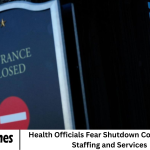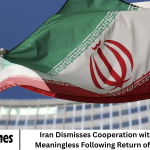France has once again found itself in the throes of political upheaval. The country’s Prime Minister has resigned after serving just 27 days in office, a shocking development that underscores the deep divisions and instability gripping French politics.
- The Brief Tenure: 27 Days of Mounting Pressure
- The Breaking Point: Clashes Over Policy and Authority
- Public Reaction: Shock, Anger, and Fatigue
- Macron’s Response: A Struggle to Regain Control
- The Broader Political Landscape: Fragmentation and Polarization
- Economic and International Consequences
- A Crisis of Confidence: What Comes Next for France
- Frequently Asked Question
- Conclusion
The resignation, which came amid growing public discontent, internal party disputes, and policy gridlock, has thrown President Emmanuel Macron’s administration into turmoil. For a nation already struggling with economic uncertainty, rising living costs, and a polarized electorate.
This latest resignation is more than just a political embarrassment—it’s a symptom of deeper systemic dysfunction. The abrupt departure leaves France without a clear path forward, heightening fears of a constitutional crisis and further weakening Macron’s ability to govern effectively.
More Read: Health Officials Fear Shutdown Could Disrupt Staffing and Services
The Brief Tenure: 27 Days of Mounting Pressure
The 27-day premiership was supposed to be a new beginning. After the previous government collapsed amid disagreements over pension reforms and public protests, Macron appointed a new Prime Minister in an attempt to reset his presidency and restore order.
However, from the start, the new Prime Minister faced an uphill battle. The government lacked a majority in the National Assembly, making it difficult to pass legislation without forming fragile alliances.
Opposition parties on both the left and right refused to cooperate, accusing Macron’s administration of ignoring the people’s will and pursuing elitist policies. The new PM’s first days were dominated by controversy, skepticism, and constant criticism.
Critics argued that the appointment was symbolic rather than substantive—an attempt to placate public anger without addressing underlying issues such as inequality, immigration, and the economy.
By the end of the first week, reports began to circulate about tensions between the Prime Minister and Macron’s inner circle, particularly over cabinet selections and policy direction. The PM’s attempts to assert independence were met with resistance from the Élysée Palace, and media leaks painted a picture of dysfunction and mistrust.
The Breaking Point: Clashes Over Policy and Authority
Insiders suggest that the final straw came during heated discussions over fiscal policy and immigration reform, two of France’s most contentious political topics. Macron, eager to push through new economic measures to reassure investors.
The European Union, reportedly clashed with his Prime Minister over how to handle rising debt and unemployment. The PM, aware of growing social unrest, favored a more cautious, socially inclusive approach—one that prioritized protecting low-income families and stabilizing public sentiment.
But Macron’s office insisted on austerity measures and spending cuts, which the Prime Minister viewed as politically disastrous. Tensions escalated further when several ministers threatened to resign in solidarity with the PM, citing frustration with what they described as a “top-down presidency.”
This revolt within the cabinet was the moment the fragile relationship between the President and his Prime Minister finally broke. On a Friday morning, after a closed-door meeting at the Élysée.
The Prime Minister tendered their resignation, saying the government could not function under “unrealistic constraints and political interference.”
Public Reaction: Shock, Anger, and Fatigue
For many French citizens, the resignation came as no surprise—but it still stung. After years of political turbulence, including mass protests by the “Yellow Vests,” pension reform strikes, and controversial social policies, the public has grown weary of what they see as endless political drama.
Social media erupted within minutes of the announcement. Hashtags like #ChaosPolitique and #MacronEnCrise trended across France. Some users mocked the government’s instability, while others expressed deep frustration at the state of democracy.
Political commentators noted that public trust in the French government is at one of its lowest points in decades. According to recent polls, more than 70% of citizens believe their leaders are disconnected from everyday concerns such as wages, inflation, and public services. The resignation only deepens that sense of alienation.
Street protests were quickly organized by unions and opposition groups, who accused Macron of centralizing power and failing to respect democratic processes. Opposition parties immediately called for snap parliamentary elections, claiming the government had lost legitimacy.
Macron’s Response: A Struggle to Regain Control
President Macron addressed the nation the following evening, calling for calm and promising a “swift and stable transition.” However, his speech did little to reassure critics. Many analysts interpreted it as defensive and vague, with no concrete plan for how to prevent similar crises in the future.
Macron now faces the monumental task of appointing a fourth Prime Minister in his presidency—an unprecedented situation that highlights the fragility of his leadership. His centrist alliance, Renaissance, no longer commands a majority in the National Assembly, forcing him to rely on complex deals .
There are also growing whispers within Macron’s own ranks about succession and post-Macron politics. With his second term already halfway through, some allies fear that the President’s legacy could be defined by instability rather than reform.
Observers note that Macron’s hyper-presidential style—marked by tight control over policy decisions and limited tolerance for dissent—has alienated many within his government. Unless he changes course, analysts warn, France could face further resignations or even early elections.
The Broader Political Landscape: Fragmentation and Polarization
France’s political system has become increasingly fractured. Traditional parties like the Socialists and Republicans have lost influence, while populist movements on both ends of the spectrum are gaining momentum.
On the right, Marine Le Pen’s National Rally (Rassemblement National) continues to build support among voters frustrated with immigration and economic decline. On the left, Jean-Luc Mélenchon’s France Unbowed (La France Insoumise) has become the leading voice for social justice and anti-austerity policies.
The collapse of yet another Macron-appointed Prime Minister has emboldened these opposition figures. Le Pen quickly took to the airwaves, calling the resignation “proof that Macron’s project has failed.” Mélenchon echoed the sentiment, accusing the President of “governing by arrogance and decree.”
As France heads toward future elections, the political center—the space Macron once dominated—is shrinking rapidly. Analysts warn that if this trend continues, the next presidential election could become a battle between the far-right and far-left, sidelining moderates entirely.
Economic and International Consequences
The political chaos in Paris has also rattled European markets and international observers. Investors fear that ongoing instability could weaken France’s economic outlook, jeopardizing its position as one of the Eurozone’s key players.
Bond yields have risen slightly amid uncertainty, while business confidence has dipped. The timing could not be worse: France is still recovering from the economic aftershocks of the pandemic, energy price volatility, and high inflation.
On the diplomatic front, Macron’s weakened government may struggle to maintain France’s leadership role within the European Union. The Prime Minister’s resignation complicates efforts to coordinate on critical EU initiatives, from climate policy to defense cooperation.
Foreign leaders, including Germany’s Chancellor and Italy’s Prime Minister, expressed concern but refrained from public criticism, emphasizing France’s “strong democratic institutions.”
Yet behind closed doors, there’s growing anxiety that prolonged instability in France could undermine European unity at a time when global challenges—from Ukraine to the Middle East—demand cohesion.
A Crisis of Confidence: What Comes Next for France
The immediate question now is: Who will lead the government next?
The search for a new Prime Minister is already underway, but Macron faces a difficult balancing act. He must find a candidate capable of restoring confidence, uniting a fractured parliament, and managing public anger—tasks that have eluded his previous appointments.
Possible successors include several experienced ministers and technocrats, but none seem capable of bridging France’s widening political divide. Some advisers have even suggested forming a coalition government—a rare move in French politics—to ensure stability.
However, the underlying issues go beyond personalities. France is grappling with a structural crisis of representation, where citizens feel disconnected from their leaders and disillusioned with the political system. Unless Macron addresses this disconnect, any new Prime Minister may face the same fate.
Frequently Asked Question
Why did the French Prime Minister resign after just 27 days?
The Prime Minister resigned due to irreconcilable differences with President Macron over policy decisions, cabinet control, and governance style. Reports suggest growing frustration with the President’s centralization of power and lack of political autonomy.
How does this resignation affect President Macron’s leadership?
It severely weakens Macron’s authority and credibility. With no majority in parliament and repeated leadership changes, Macron’s government risks paralysis and declining public confidence.
Could this lead to early elections in France?
Yes. If Macron fails to form a stable government or secure parliamentary support, opposition parties may push for snap elections. However, Macron will likely try to avoid this scenario given the risk of major losses.
How has the French public reacted to the resignation?
Public reaction has been largely negative. Many citizens express anger and exhaustion with political instability, seeing it as proof that their leaders are disconnected from real issues like inflation and wages.
What impact could this have on France’s economy?
Short-term market volatility is expected. Prolonged instability could undermine investor confidence, affect economic reforms, and reduce France’s influence in EU fiscal policy negotiations.
Who are the potential candidates to replace the resigned Prime Minister?
While no official names have been confirmed, speculation points to several senior ministers, experienced technocrats, or even cross-party figures who could appeal to both centrist and moderate opposition lawmakers.
What does this mean for the future of French politics?
The resignation deepens France’s political fragmentation. It could accelerate the rise of populist movements on both the left and right, reshaping the country’s political landscape ahead of the next presidential election.
Conclusion
The resignation of France’s Prime Minister after just 27 days in office is not merely a political scandal—it’s a reflection of a deeper malaise within French democracy. Years of reform fatigue, social unrest, and partisan division have eroded the nation’s sense of unity and trust in institutions.
President Macron, once seen as a visionary reformer, now faces his toughest test: rebuilding credibility and stability in a fractured nation. His next moves will determine not only the future of his presidency but also the trajectory of French politics for years to come.
Whether France can overcome this period of instability will depend on its leaders’ ability to listen, compromise, and reconnect with the people. For now, however, the only certainty is uncertainty—and a nation once again searching for direction.














